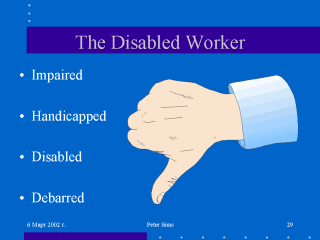| front |1 |2 |3 |4 |5 |6 |7 |8 |9 |10 |11 |12 |13 |14 |15 |16 |17 |18 |19 |20 |21 |22 |23 |24 |25 |26 |27 |28 |29 |30 |31 |32 |33 |review |
 |
Certain
impairments and subsequent handicaps will debar their sufferers from particular
occupations e.g.The epileptic from bus driving. Disability is the slant placed upon handicapping conditions by society and extends to the world of work. Often it is assumed that people with severe handicaps cannot work nor would wish to do so. In fact if the work place can be adapted to their needs then they often want to work, are conscientious, proud of their skills, productive and glad to be part of the “world of work” rather than the “world of dependency”. Their presence in the workplace is an important influence on the other workers and helps their integration into society. There may be a quota system trying to ensure that a firm or company employs a minimum percentage of disabled workers and has an environment adapted to their special needs. This may not work for many disabled people are reluctant to be registered as such because of the associated stigma. There may be special workshops for disabled men and women-classically for the blind or sometimes sheltered workshops where their employment is subsidised despite low productivity for the beneficial effects upon their self pride and physical and mental health.. |